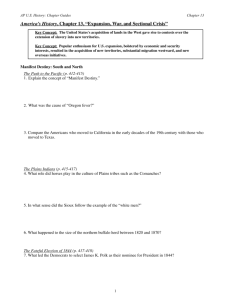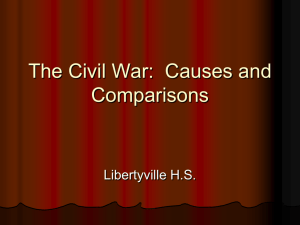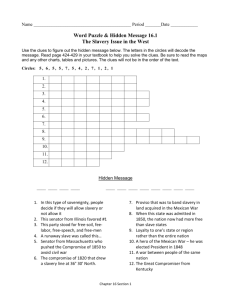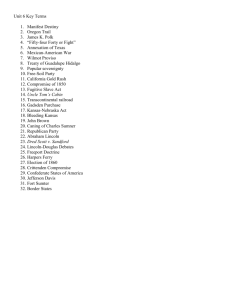Westward Expansion - Faculty
advertisement
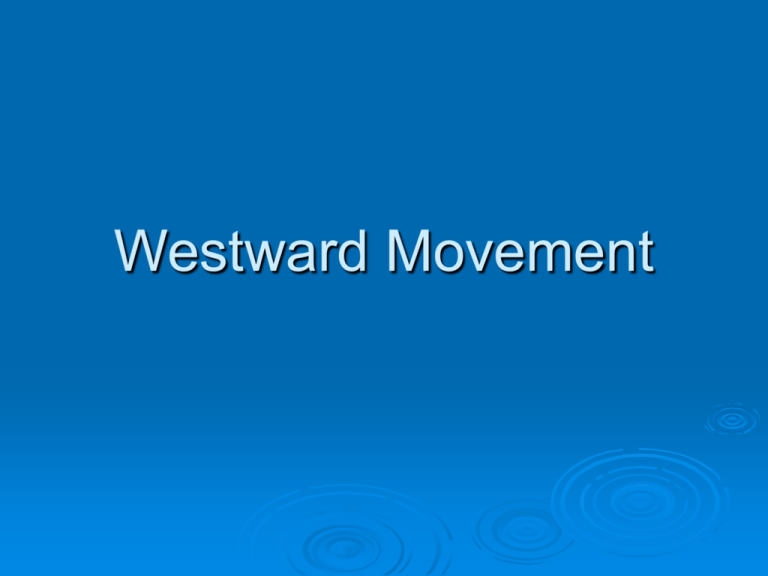
Westward Movement By 1850-no stopping expansion Quadrupling of size and population More than ½ the population lived west of original 13 states Manifest Destiny Term coined by John O’Sullivan to describe westward movement Belief that America destined to control the lands from Coast to Coast Young America movement • Combination of pride, missionary zeal and racist attitudes Oregon Country 1st major movement Land jointly occupied with British Oregon Fever (1833) Starts as missionary movement Oregon Trail By 1869, 350,000 migrated Demanded government protection • Chain of forts 4-6 month trip—grueling trip Mormons Not all ventured to Oregon Mormons chose to settle in arid west Site near Salt Lake City After years of attack seeking freedom and isolation Deseret—1,000 miles from U.S. territory Roots of Mormonism Product of religious reforms of 1830’s in Upstate New York Joseph Smith Non-Mormons branded group heretics Resented communal element/polygamy Attitudes toward Blacks and Indians Driven from NY-Ohio-Missouri-Illinois Nauvoo, ILL—community of 15,000 Smith killed by mob Movement west New Leader—Brigham Young 1846-12,000 go west Find spot at Great Salt Lake Irrigation system Cooperative labor In 1850, Deseret annexed by U.S. as Utah territory Tension between Mormons and government Texas In SW-Anglos confronted Spanish frontiersmen Mexican province of Texas attracted settlers Stephen Austin’s family given huge tract of land • 10 cents per acre • 1000’s of southern farmers poured in • By 1835—30,000 Americans Mexican government knows it has problem Texas Rebellion Texans resent Mexican control Want input in local affairs Want slavery Republic of Texas- Opposed by Santa Anna Ultimately want to join the United States as slave state Initially refused due to slavery issue Politics of Expansion Nothing automatic about territorial expansion Impact both Tyler and Polk Administrations Polk able to gain control of Oregon Country “54-40 or fight” Settles for less but gains land peacefully. Mexican War 1845—Annexation of Texas seriously effected the relationship between U.S. and Mexico. President Polk very interested in admitting other Mexican Provinces with American settlers New Mexico California • Offers to purchase—rejected by Mexico Mexican War U.S. provokes conflict Wants land War divides the nation War lasted much longer than expectedMexicans refused to surrender Forced to attack and capture Mexico City U.S. gains 500,000 square miles Treaty of Guadalupe-Hidalgo Gave U.S. what it wanted. Great California ports Americans not interested in the rest of Mexico. Racist attitudes Results of War Divided the American public Fear that war was to spread slavery and influence of the south Reopens sectional wounds Wilmot Proviso (1846) Amendment to appropriations bill to prevent slavery in territory gained in the war Territory only open to whites Wilmot Proviso Frames debates for next 15 years Northerners unite to support Southerners unite to oppose Polk naively hoped expansion would strengthen bonds of union-WRONG!!! Violent debate erupts every time slavery discussed Problem Constitution did not deal with slavery in future states. Congress has right to regulate Missouri Compromise-attempt • Line sought to settle future cases • ?—Mexican cession Northerners unwilling to see California & New Mexico slave states California Discovery of gold near Sacramento Massive population influx Demands political organization What to do with Territories? Reflects sectional distrust—neither side wants to give in Compromise of 1850 Put together by Henry Clay California—free state Rest of territory open to slavery Abolishes slave trade in Washington DC Fugitive slave laws enforced. Provided short term peace No national support for any part of deal Free Soil Movement Anti-slavery movement Desire for western lands Promise of economic betterment • Want free homesteads Avoid competition with slave plantations Unlike abolitionists, appealed to racism Southerners resented suggestion of exclusion fro new territories. Fugitive Slave Law Special federal commissioners determine status No right to defend oneself Series of violent confrontations Southerners often accused the North of reneging on a promise Of 332 blacks put on trial under the law, about 300 were returned to slavery Uncle Tom’s Cabin Novel by Harriet Beecher Stowe creates a firestorm Shocked by Fugitive Slave Law Not a writer nor abolitionist Little direct knowledge of slavery Made slavery personal “Gave slavery a face” Moved active many Northerners from sideline to Kansas-Nebraska Issue Peace of 1850 short-lived Stephen Douglas proposed bill to organize territory west of Iowa and Missouri Railroad development Sought to avoid controversy by proposing admission based on Popular Sovereignty Reality--Devastates sectional harmony Destroys two party system Whig Party collapses Sectionalism reigns Republican Party Outgrowth of anti-K-N sentiment Opposed to expansion of slavery in territories-free soil ideals Not abolitionists Builds party quickly-by 1856 ready on national level Major alternative to Democrats in the North Bleeding Kansas Kansas Proslavery Missourians corrupt election Free-soilers establish rival government Civil elections War breaks out Proslavery attack on Lawrence John Brown attack Discredits idea of popular sovereignty Brooks-Sumner Incident Reflects loss of civility in Congress Preston Brooks beat Charles Sumner with cane on US Senate floor. Sumner made rude remarks about Preston’s uncle, S.C. Senator Sumner seriously injured-3 years to recover South and North take very different views of the incident Election of 1856 Republicans chose John C. Fremont Democrats run James Buchanan Fremont outpolled Buchanan in the North Buchanan won South and key states of Indiana, Illinois and Pennsylvania Showed how parties had re-oriented on sectional lines Results to South Discomforting at best New Party with novice candidate came very close to winning. Swing of just a couple states with give Republicans the White House Incomprehensible to South Dred Scott Major Supreme Court Decision Roger Taney—Chief Justice Congress could not deny the right to take property (slaves) into territories Slave was not citizen Slavery could not be excluded from the territories. Kansas-LeCompton Constitution Buchanan supports pro-slavery minority legislature Despite clear signs of free-soil majority Splits Democrats in Congress Stephen Douglas breaks with President Panic of 1857 Economic recession that strikes growing new industries of the North hard Relatively mild impact on Southern states Cotton exports not impacted South believes it has superior economic system King Cotton globally important Lincoln –Douglas Debates Lincoln challenges Douglas to debate One major issue—should slavery be excluded from territories 7 sites in state Lincoln gains national profile Douglas wins election John Brown’s Raid Radical, possibly insane, abolitionist Seized federal arsenal at Harper’s Ferry Arm slaves, set up stronghold in Virginia Fails—Robert E. Lee Brown tried for treason South sees no difference between Brown and Republicans. Democratic Convention of 1860 Charleston, SC Struggle over platform—proslavery plank loses Convention splits South nominates John Breckenridge North nominates Stephen Douglas Lincoln and Bell Republicans nominate Abraham Lincoln Remains of Southern Whigs nominate John Bell Election of 1860 No candidate generated a national following Lincoln vs. Douglas Breckenridge vs. Bell False impressions Lincoln not on ballot in 9 Southern states Secession of Deep South Dec 1860-S.C. leaves union Followed by Mississippi, Florida, Alabama, Georgia, Louisiana and Texas Convention—Montgomery, Alabama Jefferson Davis-president Determined, decisive minority seized control Buchanan’s failure In period between November and March, President Buchanan does nothing. Crittenden Proposal—last gasp at compromise New President Initially did not see war as inevitable Walked tightrope—tried to be conciliatory Avoid alienating border states First Shot South fires first shot over Ft. Sumter Charleston harbor Forced to surrender Lincoln declares insurrection exists in South and calls up 75,000 troops Virginia, N. Carolina, Tennessee and Arkansas join Confederacy Tale of the Tape Almost all comparisons favored the North Population 22 million vs. 9 million Industrial production, railroad mileage and financial resources the North far outstripped the south. Burden of the North To restore union, it had a major task Invade and conquer an area larger than Western Europe. Confederate troops were highly motivated Defending homes and families Southern armies could lose most of the battles and still win the war.
